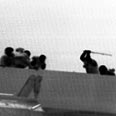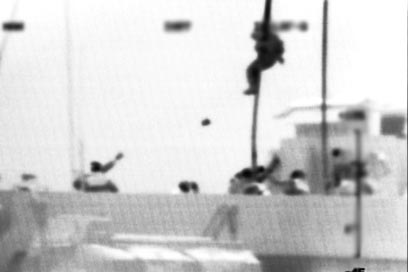
Palmer Report fails main objective?
UN commission probing raid on first Gaza flotilla falls short of resolving Israel and Turkey's differences; manages to hold both parties responsible for tragic results, while assigning no real blame
The United Nations Palmer Report on Israel's raid of the 2010 Gaza-bound flotilla failed to accomplish its main objective – devising a compromise between Israel and Turkey.
Turkey announced on Friday that it will stand by its demand for an official apology from Israel, while sources in Jerusalem were adamant that no such apology will be offered.
Related stories:
- UN report: Israel should compensate Turkey
- Israel defiant: No apology to Turkey
- Turkey rebuffs Palmer findings
- Turkish ultimatum to Israel: Apologize or face 'Plan B'
The 150-page report managed to find fault in both Jerusalem and Ankara's actions, but assigns no real responsibility for the raid's tragic results other than alluding to the fact that the Turkish-based IHH, which was one of the flotilla's chief sponsors, operated out of "questionable motives."
The report, which was first published by the New York Times on Thursday evening, essentially sanctioned Israel's maritime blockade of Gaza Strip as a legitimate step rooted in national security interests – a conclusion Jerusalem sees as a feat, as the blockade has been repeatedly used to discredit Israel and delegitimize its efforts to thwart Gaza terror.
"The blockade satisfied the customary international law requirements for the imposition of a blockade, including the requirements of notification, effectiveness and enforcement," the report said.
"Israel is complying with its humanitarian obligations… The blockade does not constitute collective punishment of the civilian population of the Gaza Strip."

Commandos taking the Marmara (Archives: IDF Spokesperson’s Unit)
The report did, however, censure the IDF's use of "excessive and unreasonable" force during the Marmara takeover, which left nine people dead.
UN Secretary-General Ban Ki-moon is expected to receive the full report later on Friday.
- For the full report click here
'Report has no grasp on reality'
IDF sources criticized the report's determination that the Naval Commandos involved in the raid used excessive force, blasting the conclusions as having a "no grasp on reality."
"It is very easy to analyze an event after the fact and point to what should have been done. The IDF and the Navy have drawn the necessary conclusion, but should IDF soldiers be assaulted in a future incidents, we cannot guarantee that the other party wouldn’t suffer casualties," a defense establishment source told Ynet.
Neither the Defense Ministry nor the IDF have issued an official response to the report at this time.
The report's core conclusions are as follows:
1. The events of May 31, 2010 should not have ended as they did, and extensive efforts should be applied to ensure they do not happen in the future.
2. The principle of free maritime movement can be subjected to exceptions under international law. Gaza's militant groups pose a true threat to Israel and it imposes a naval blockade as a legitimate way to prevent weapons from finding their way into Gaza via its waters. The matter in which the blockage is enforced coincides with international law.
3. The Gaza-bound flotilla was not a governmental initiative.
4. While people have the right to express their political views, the flotilla's attempt to breach the Gaza blockage was reckless. The majority of the sail's participants bore no violent intention, but the true intentions of the organizers, and especially thos of the IHH, raise serious concerns; as they brought about a potential escalation that could have been avoided.
5. Neither Israel nor Turkey initiated the incident. Both countries applied measures meant to avoid harming human lives, peace and international security. Nevertheless, more could have been done to alert the sail's participants of the potential risk involved, and dissuade them from taking part in it.
6. Israel's decision to board the Marmara using the forces it did with no final warning to the vessel was exaggerated and unreasonable. Non-violent options should have been explored further. Once the force had boarded the ship, and faced with the resistance it met, Israel should have reevaluated its options.
7. The Israeli forces encountered significant, organized and violent resistance by a group of the Marmara's passengers, which called for the use of force in self defense.
8. The loss of life and injuries suffered by passengers as a result of the Israeli forces' actions in unacceptable. Israel has failed to provide the commission with a satisfactory explanation as to the nine deaths, and especially as to findings indicating that some of the fatalities were shot multiple times, including at close range and in the back.
9. Once the raid was over, the Israeli authorities did mistreat the passengers, pending their deportation. Such mistreatment included intimidation, the confiscation of personal belongings and delaying consular services.
'Media owes us an apology'
Members of the Turkel Committee that was named by the government to probe the events of the raid, were overall satisfied with the Palmer Report, which they said concurred with most of their findings.
"The Palmer Report is one of the most favorable international reports ever complied on Israel," a source close to the committee said. "The report clearly states that the blockade is legal and that the decision to board the Marmara was legally sound… The biggest accomplishment is that the report legally differentiates between the naval blockade and the issue of the crossings."
The committee, the sources added, would like to see the Israeli media "apologize for portraying us as a group of senile old men whose report was a rubber stamp. The media should say it's sorry."
Hanan Greenberg, Ronen Medzini and Aviad Glickman contributed to this report
- Follow Ynetnews on Facebook
- Receive Ynetnews updates directly to your desktop










